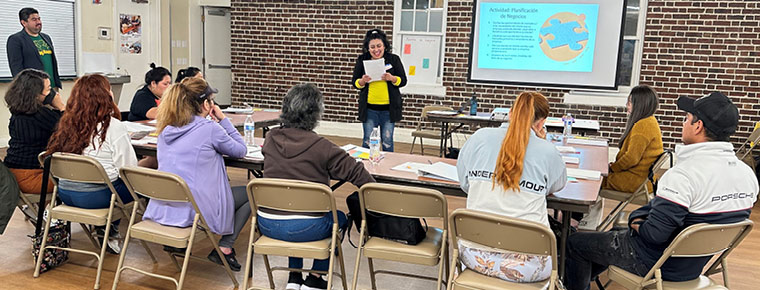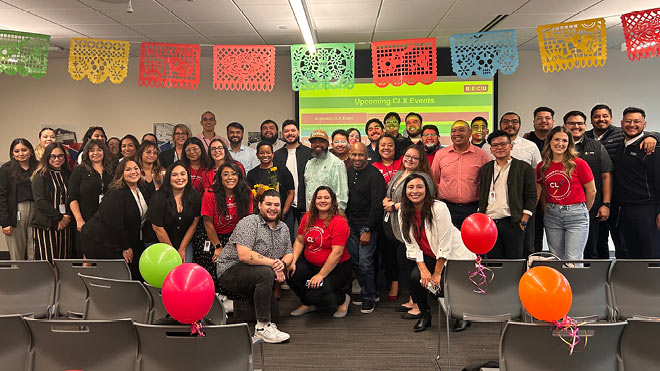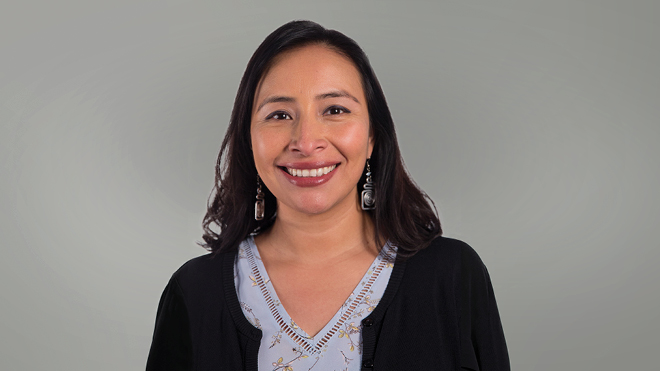
Latinx-Owned Businesses See Growth
Nearly one out of every four new businesses are Latinx-owned — but owners still face disproportionate challenges seeking business loans. We share more on the barriers, celebrate successes and highlight community commitment to access.
Latinx Heritage Month runs from Sept. 15 through Oct. 15.
And there's plenty to celebrate. Nearly one out of every four new businesses are Latinx-owned, the U.S. Small Business Administration reports, and almost 5 million Latinx-owned businesses in the U.S. contribute more than $800 billion to the American economy annually.
The number of Latinx-owned businesses has grown 44% in the past 10 years, according to Stanford Latino Entrepreneurship Initiative (SLEI)'s recent research.
But Latinx businesses face disproportionate challenges to capital access for starting or growing a business, with only 2 out of 10 loan requests approved, according to the Seattle Latino Metropolitan Chamber of Commerce.
The top funding-need reasons included expanding businesses, acquiring additional capital assets and meeting operation expenses, according to the 2022 SLEI research. Common financing in 2022 involved business credit cards, business loans from national banks, personal credit cards, and business loans or investments from family or friends.
Due to the low bank loan approval rates, businesses disproportionately tap into personal and family savings to support and expand their businesses, SLEI notes. Which presents another issue.
"The Latinx community doesn't have built-in generational wealth, so borrowing larger amounts can be difficult," said José Manuel Vasquez, a first-generation immigrant and CEO of Growing Contigo LLC, a consultancy dedicated to empowering entrepreneurs.
Latinx Americans inherit funds at extremely low rates (less than a 2% chance of receiving an inheritance) and have overall lower household wealth, according to a 2023 report from the National Community Reinvestment Coalition (NCRC). The median wealth of a Latinx household was $48,720, around 20% of non-Hispanic White households' median wealth of $250,400.
The NCRC report also noted some bright spots — Latinx individuals have far less debt than non-Hispanic populations while buying homes at higher rates and younger ages.
Bridging Gaps for Funding
Immigrant entrepreneurs are also historically left out of traditional business systems and can benefit from the demystification of existing systems. "In a place like the Pacific Northwest with plenty of wealth and resources, not everyone is benefiting from that economic growth," Vasquez said.
Vasquez works with many Latinx owners starting, managing and expanding businesses such as restaurants, nonprofit organizations, retail stores, auto shops, and even small rural family farms across Washington.
The unfamiliarity of existing financial systems can also be overwhelming, such as understanding that you need to speak with a business loan officer, what questions to ask, and what the officer expects to review. "If you haven't been exposed to that before, lending is an unknown," Vasquez said. "I help break down what to ask and who to ask it from."
Businesses may not have various components in place that banks seek out — for example, a business plan, budget projections, or three months of emergency fund expenses. The solution relies on building a business owner's financial capability, such as teaching business owners how a bank determines creditworthiness.
Vasquez helps people translate forms, navigate government and institutional systems, and refer to organizations like Business Impact NW that help with loan readiness.
Other challenges can include immigration status, lacking a credit score, or not having a Social Security number — and a tax ID number can't substitute. Combined problems can lead to a very high-interest loan, which dissuades potential borrowers.
As a result, individuals and businesses often rely on lending circles for smaller amounts, where 10 people contribute to a pot of funds monthly. Then, each person withdraws funds in a monthly rotation. The circle acts like a shared savings account, providing access to larger funding without relying on interest-bearing loans.
Success Stories
Vasquez said that loan approval is one of several challenges Latinx communities face in business startups and growth. He works with Seattle-area clients, including nonprofits and government agencies, to develop economic empowerment programming and partner with nonprofits in delivering training programs for small, Spanish-speaking businesses.
In short, Vasquez is a bridge-builder between small Latinx businesses and existing business ecosystems, connecting businesses and nonprofits with business coaching and entrepreneurship resources, technical assistance (such as logo design and website development), and business and budget planning.
Due to this expertise, Vasquez witnesses broad-based trends in the Seattle-area Latinx communities and individual examples of business growth.
Vasquez is implementing an incubator in Seattle's South Park neighborhood with Villa Comunitaria, a Latinx and women-led nonprofit helping manage the program and recruit participants. Seattle and King County's largest Latinx resident concentrations reside in South Park, according to Villa Comunitaria.
The Spanish-language program began in April 2023 and wraps up in November. Among 24 applicants, 10 participants were selected — an all-women-owned entrepreneurship cohort. Spanish-speaking accountants, insurance agents, and lawyers share knowledge and information. Through this incubator program, graduates can more easily tap into capital investments while launching or expanding their businesses.
The inaugural pilot cohort includes around one-third of businesses starting as retail or selling at farmers market booths, a third mainly dabbling in the business as a hobby, and another third still in the conceptual stages.
One success story has been Lupiñatas, founded by a participant who grew up making beautiful piñatas with family and friends. The participant entered the program hoping to transform her piñata-making passion into a business, crafting customized pieces based on client requests, such as a child's favorite TV show or a hand-decorated piñata featuring a child's name.
However, when the participant started selling her works, she only charged what big-box stores charged for a basic piñata. She was barely covering the cost of materials.
Vasquez recommended valuing her time making a custom premium product -- something you can't find at big-box stores. The participant learned to perform competitive analysis and refine her messaging and marketing. Now, she gets three weekly piñata orders on average and is investigating partnerships with local stores.
"Seeing her transition from an idea, a hobby, and passion to carefully analyzing costs, revenue projections, and building a sustainable business is rewarding," Vasquez said.
The program's participants test one another's products and ideas, give feedback, and motivate one another. Investing in a community can help build the community's own support system and become more self-sufficient. "More than just training, this is a community we're building," Vasquez said.
"Bringing resources to businesses in culturally and linguistically relevant ways takes a little longer and requires more time to build trust and a relationship with hard-to-reach populations," Vasquez said. "But bringing this content in an accessible way is even more effective than I expected."

